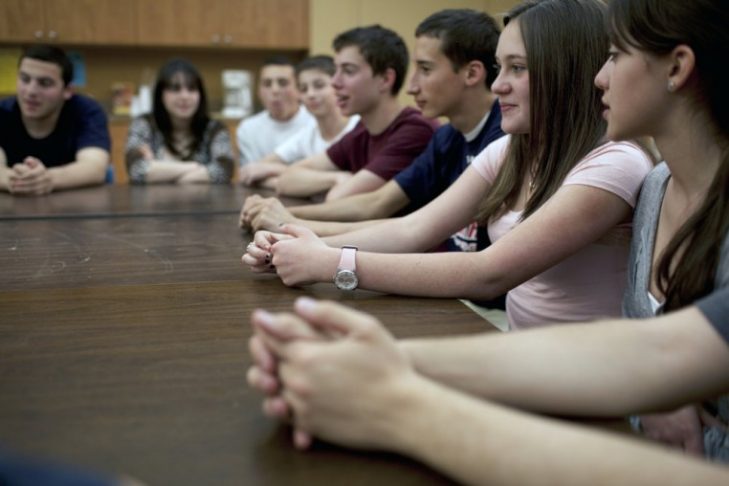It’s that time of the year again. YES…that time. That time of the year where we think, “Wait…how and where did summer go? Did three months actually just fly by in the blink of an eye?!” Yes, they did. With Labor Day behind us, we have officially said goodbye to summer and hello to the new school year. For most, it’s bittersweet; the relaxation (of camps, trips, and so on) is gone but the enthusiasm of getting back into a healthy routine of academics, sports, extracurricular activities and religious programs has returned. This also means that fall is around the corner and everyone knows that fall in New England is the best time of year.
As (Jewish) educators, it means we (which is where I begin to refer to myself) really have to rush to get back into the swing of things. We are sort of at a loss for where that time went and had such high hopes for projects, curriculum development, and other new things we would be working on during the summer (or is that just me…?). Not only is it time for school, but the chagim will also be here before we know it…and trying to get consistent work done throughout those crazy few weeks of holidays is quite the challenge. So here I am, trying to (not-so-secretly) hide my stress at work as we start classes at Prozdor this weekend in addition to kicking off our other large community-wide program, the Jewish Teen Foundation of Greater Boston (JTFGB), in a few short weeks.
While work is of course allowed to stress us out (we’re only human), it can be easy to get lost in all of that and lose sight in the reason why you do what you do. What do I mean? Most people who know me know that I love my job. Truly. Honestly. Wholeheartedly. I have such an incredible passion for what I do—working with teens and sharing that passion for giving back to this world we all live in. So what do I do when I feel tons of work piling on and the pressure completely building up all around me? I remind myself why I do what I do. Needless to say, this time of year—the transition from summer to fall—is definitely a time where I need to do a lot of that reminding.
Fortunately, even with all of the operational and administrative type of tasks throughout my days in the office (and at home in the evenings), I am still able to recognize the sweetness and reward of this work. This recognition can come in many forms, but lately it’s been channeling from one place in particular—JTFGB, the philanthropy program I run. Teens (in grades 9-12) who are interested in being a part of JTFGB must submit an application followed up with an interview. As I receive these applications every few days and meet the students during their interviews, I remember. Meaning, I read their applications and listen to what they say, why they are interested in participating in such a unique program like this and are usually pretty shocked with what I hear. There is no way I was like that as a teenager. (Right?)
Last week I got the standard email notification that a new application had been submitted. I opened it and and began to go through motions—those operational and administrative tasks that make up a large part of my job—seeing how old the teen was, where they live, school, synagogue, and all of the other demographics one would assume to look for. When it was time for me to read the essay portion, I was…kind of…blown away. Those daily reminders I need during my times of stress about why I do what I do…well, this applicant’s essay had it written all over it. (Yes, literally.) His words were beautiful. They spoke to me. His words proved that he is wise beyond his years and I couldn’t wait to share this with my boss and show him what this teenager from Sharon wrote. I was so thrilled, after reading his entire application (but particularly his essay) that I am going to have the opportunity to work with him this year. He is going to be a participant in my program. I am going to get to teach him (even more) about philanthropy and giving back.
As an educator, I am the one who has the sweet and rewarding opportunity to share my knowledge of Jewish values within this program and (hopefully) make a lasting impact on his life. So this…this is exactly what I’m talking about. What an incredible reminder (and distraction) from the stress of other things at work—just what I need. Even in the craziness of a new (academic and Jewish) year, that stress behind all of the work can be worth the worry when we are able to identify and pull out those specific noteworthy moments, which are almost always provided by the teens themselves.
Okay. Did you really think I was going to leave this hanging without a glimpse of the essay? Below are some of the words from the aforementioned teen’s application. To say that I am beyond excited to have (about) 60 teens just like him participating in JTFGB this year would be quite the understatement. That’s about 60 teens who are also unique leaders; 60 teens who are just as thoughtful, caring and genuine when it comes to others within their communities; 60 teens who want to learn to (and will) give back through a Jewish lens; 60 teens who are going to make a difference in this world. Yes, this is what I get to do…and why. These teens are the most amazing reminder there is.
“Fyodor Dostoyevsky was a Russian author in the 1800s. He once said, ‘The secret of man’s being is not only to live but to have something to live for.’ We often spend our time doing with little giving. Our lives are spent looking inward and too little time is focused on others. Compassion fosters stronger connections between people even if they do not know each other. If we spend more time giving, we will find a purpose in life. Tikkun olam reflects this philosophy beautifully. We take much for granted, and there are so many people all around the world that have unfathomably less than we do. The irony of it is that they sometimes can be more happy than us.”
“I believe one’s childhood is one of the most important periods of one’s life. Nonetheless, there are plenty of children around the world that do not get the same opportunities as I do. … I know the money I raised [for my bar mitzvah project] had a great impact on the children there. The importance of parents in one’s childhood is paramount, which is why I felt so much pity for [those who benefitted from my project]. There is no sum of money that could bring back what these kids lost, but this money benefitted them in other ways.”
“The idea of tikkun olam in this sense is not entirely to repair, but to change. If you repair a broken object, it is still the same object. What tzedakah should do is create new opportunities. Progress is more than just fixing, it is creation. When I gave money to [the organization], I knew I wasn’t bringing these kids’ parents back or anything of the like, but I still know I made them happier in other ways. The money was used to sponsor a bar mitzvah party as well as some infrastructure [there].”
“By participating in JTFGB, I hope to raise money for those much less fortunate than me. Not only will I help others immensely, but I feel that through tikkun olam I will grow in many ways myself. The impacts of giving are a not a one-way street; helping others will help me grow and is how I know that I can change the world.”
And on that note…I am inspired. I have my reminder. My work is worth the worry. Transitions from one season to another aren’t always easy, but you should still find the good in little moments like this—or whatever else it is that speaks to you. I would imagine that going back to school is even more stressful for kids, so I applaud them for their strength at times like this. Between academics, sports, activities, Jewish programs and the new Jewish year sneaking up on us in a few weeks, I know I will be able to see the good in it all. Another year of growth, learning, and, of course, inspiration, with and from all of those around me. I am looking forward to working with those who have already been accepted into JTFGB, but I would love to be able to work with even more outstanding teens like this. We are still accepting applicants for another two weeks; the application (and more information about the program) can be found at cjp.org/jtfgb.
L’shana tova u’metuka—to (an early) good and sweet new year.
This post has been contributed by a third party. The opinions, facts and any media content are presented solely by the author, and JewishBoston assumes no responsibility for them. Want to add your voice to the conversation? Publish your own post here. MORE



